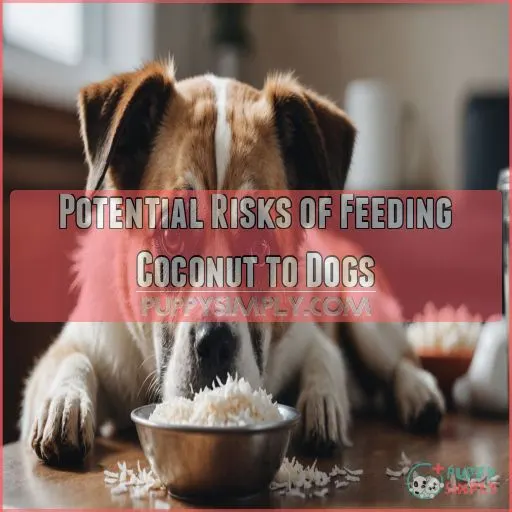This site is supported by our readers. We may earn a commission, at no cost to you, if you purchase through links.
 Yes, dogs can eat coconut, but moderation is key!
Yes, dogs can eat coconut, but moderation is key!
This tropical treat offers some tail-wagging benefits for your furry friend.
Raw or dried coconut meat, unsweetened shredded coconut, and virgin coconut oil can boost your pup’s immune system, improve their coat, and support digestion.
It’s like a spa day for your dog!
But don’t go coconuts – too much can lead to tummy troubles or weight gain.
Stick to small portions and avoid sweetened products.
Remember, every dog is unique, so introduce coconut slowly and watch for any adverse reactions.
With the right approach, you’ll have your pooch going coco-loco for this healthy snack in no time!
Table Of Contents
- Key Takeaways
- Safe Coconut Options for Dogs
- Health Benefits of Coconut for Dogs
- Potential Risks of Feeding Coconut to Dogs
- How Much Coconut Can Dogs Safely Eat
- Coconut Products Dogs Should Avoid
- Creative Ways to Serve Coconut to Dogs
- Choosing The Best Coconut Products for Dogs
- Frequently Asked Questions (FAQs)
- Can puppies eat coconut?
- Is it good to eat coconut? What are the health benefits of having coconut?
- Can dogs eat coconut flesh?
- Can dogs eat coconut oil?
- Is it safe for dogs to eat coconut?
- How much coconut can I give my dog?
- Is coconut shell ok for dogs?
- Can dogs have sweetened coconut flakes?
- Is coconut milk safe for dogs with lactose intolerance?
- Can coconut help with my dogs bad breath?
- Are there age restrictions for feeding coconut to dogs?
- How does coconut affect a dogs digestion?
- Can coconut oil be used topically on dogs?
- Conclusion
Key Takeaways
- You can safely give your dog coconut in moderation, as it offers health benefits like improved immunity and coat health.
- Stick to unsweetened, pure coconut products and avoid artificial additives, sweetened flakes, and coconut shells.
- Start with small amounts and monitor your dog for signs of digestive issues or allergic reactions.
- Consult your vet before adding coconut to your dog’s diet, especially for puppies or dogs with health conditions.
Safe Coconut Options for Dogs
You’ll be happy to know that your dog can safely enjoy several forms of coconut, from unsweetened shredded meat to a dollop of coconut oil.
Whether you’re looking to add some tropical flair to your pup’s treats or boost their health with coconut’s benefits, you’ve got options that’ll make both you and your furry friend smile.
Raw and Dried Coconut Meat
Inside the world of dog-friendly treats, raw and dried coconut meat can be a tasty addition to your pup’s diet.
Both options are safe when given in moderation – just a small pinch per serving.
The dense, white meat is packed with healthy fats and nutrients that can benefit your dog’s skin and coat.
Be careful though – the high fat content means you’ll want to introduce it slowly to avoid tummy troubles.
Remember to always remove the shell, as it’s a potential hazard.
Unsweetened Shredded Coconut
Looking for a tail-wagging treat? Unsweetened shredded coconut can be your pup’s new best friend. You can safely sprinkle a small pinch on their food or use it as a special reward.
While your furry friend might give you those irresistible puppy eyes for more, remember that moderation is key – too much can lead to tummy troubles.
This tropical treasure packs a punch with manganese for bone health and antioxidants that’ll keep your pooch’s tail wagging.
Coconut Oil for Dogs
Virgin coconut oil can be a game-changer for your pup’s health when used correctly.
Before you jump on the coconut oil bandwagon, let’s sniff out the facts.
Here are three key benefits for your furry friend:
- Promotes a glossy, healthy coat
- Supports digestive health
- Helps boost the immune system
But hold your horses! Start with small amounts to avoid tummy troubles or pancreatitis. A little dab’ll do ya – just 1/4 teaspoon per 10 pounds of body weight daily.
Unsweetened Coconut Milk
Pet parents, when choosing healthy dog treats, it’s essential to consider nutritional balance and ingredient lists, such as those found in healthy dog treats. You’ll be glad to know that unsweetened coconut milk can be a healthy treat for your furry friend.
This creamy delight can boost your pup’s immune system and even freshen their breath.
Start small – just a few milliliters per day to let their system adjust.
But don’t go overboard! Too much might lead to an upset tummy, so keep it as an occasional treat rather than a daily indulgence (Source).
Coconut Flour in Dog Treats
Thanks to its gluten-free goodness, coconut flour has become a top-dog choice for homemade pet treats.
You’ll love that it packs more protein and fiber than traditional wheat flour, making tails wag for healthier snacks.
When baking with this pup-friendly alternative:
- Replace wheat flour at a 4:1 ratio (use 1/4 cup coconut flour for 1 cup wheat flour)
- Add liquid gradually as it’s super absorbent
- Let the dough rest for 5-10 minutes to thicken properly
Coconut Water Without Additives
Three cheers for pure coconut water – it’s nature’s sports drink for your furry friend! You’ll want to stick to additive-free options like olive oil that can enhance skin and coat health and boost your dog’s immune system naturally. Just like us humans reaching for a cool drink, your pup can safely enjoy this tropical treat in moderation.
| Coconut Water Tips | Benefits | Watch Out For |
|---|---|---|
| Use pure, unsweetened | Hydration boost | Xylitol additives |
| Offer in small amounts | Natural electrolytes | Added sugars |
| Try freezing as treats | Immune support | Artificial flavors |
| Check ingredients list | Digestive aid | Too much potassium |
| Make homemade version | Cooling reward | Commercial brands |
Health Benefits of Coconut for Dogs
You’ll be happy to know that coconut offers several health perks for your furry friend.
From boosting their immune system with lauric acid to improving their skin and coat health, this tropical treat can be a beneficial addition to your dog’s diet when given properly.
Manganese for Bone Health
Now let’s talk about your pup’s bones!
You’ll love knowing that coconut’s manganese content plays a key role in keeping your dog’s skeleton strong and healthy.
Just like building blocks need glue to stick together, your dog’s bones need manganese for proper development.
Without enough of this mineral, dogs can end up with shortened or bowed legs, joint problems, and even lameness.
It’s one more reason coconut makes a tail-wagging treat!
Antioxidants From Phenolic Compounds
Beyond building strong bones, your furry friend can tap into the antioxidant power of coconut.
Those tiny phenolic compounds pack a serious punch, fighting off harmful free radicals like a superhero squad for your pup’s cells.
Here’s what these mighty molecules do:
- Shield your dog’s cells from daily damage
- Support natural repair processes in the body
- Keep your four-legged friend feeling younger, longer
Think of phenolic compounds as your dog’s personal bodyguards, working around the clock to keep their body in tip-top shape.
Lauric Acid for Immune Support
Coconut’s got another trick up its sleeve for your furry friend: lauric acid.
This powerful compound is like a superhero for your pup’s immune system.
It’s known to pack a punch against harmful bacteria, giving your dog’s defenses a real boost.
Think of it as nature’s way of putting up a "No Trespassing" sign for pesky germs.
Your dog’s body will thank you for this immunity-boosting treat!
Improved Skin and Coat Condition
Let’s talk about your furry friend’s fabulous fur!
Coconut boosts immunity, it’s also a game-changer for your dog’s skin and coat.
It’s like nature’s conditioner, tackling dry skin, shedding, and allergies.
The fatty acids in coconut oil can give your pup’s coat a Hollywood-worthy shine and soothe itching.
Just imagine your pooch strutting down the sidewalk, turning heads with their glossy, healthy coat!
Digestive Aid Properties
Your dog’s gut health might thank you for adding coconut to their diet.
It’s like a digestive superhero, tackling upset stomachs, diarrhea, and constipation.
The lauric acid in coconut helps maintain a healthy gut, potentially easing IBS symptoms.
Plus, it’s a natural gas-buster!
Just remember, moderation is key. Too much of this tropical treat can lead to tummy troubles, so start small and let your pup’s tail-wagging be your guide.
Anti-inflammatory Effects
The anti-inflammatory powers of coconut can be a game-changer for your furry friend.
It’s like a natural ibuprofen for dogs, easing joint pain and arthritis.
Coconut oil, in particular, can help calm allergic reactions and reduce inflammation throughout your pup’s body.
Think of it as a superhero cape for your canine companion, fighting off pesky inflammation and keeping them bouncing like a puppy.
Just remember, moderation is key!
Potential Risks of Feeding Coconut to Dogs
While coconut can be a tasty treat for your furry friend, it’s not all smooth sailing in doggy paradise.
You’ll want to watch out for potential risks like choking hazards, digestive issues, and weight gain that could turn your pup’s tropical adventure into a not-so-fun beach day.
Choking Hazards From Large Flakes
Large coconut flakes can be a real pain in the neck for your furry friend.
Like a game of canine Jenga, large chunks pose a serious choking risk.
Instead, opt for smaller, bite-sized pieces or shredded coconut that’s easier to chew and swallow.
Always supervise your pup during treat time, and consider mixing coconut into their regular food for a safer, tropical twist on mealtime.
Digestive Issues From Overfeeding
While coconut flakes can be a choking hazard, overfeeding poses its own risks.
Too much coconut oil can lead to a greasy surprise on your floor – coconut diarrhea.
Signs of upset include vomiting and loss of appetite.
It’s like a fat overload for your pup’s tummy.
To keep your dog’s food balance in check, start small and gradually increase the amount.
Remember, moderation is key to avoiding a fiber fiasco!
High Calorie Content and Weight Gain
Despite its health benefits, coconut packs a caloric punch that could leave your furry friend feeling a bit rotund.
You’ll want to keep an eye on portion sizes to avoid tipping the scales.
Think of coconut as the canine equivalent of your favorite dessert – delicious but best enjoyed in moderation.
Stick to the 10% treat rule and consider healthier, lower-calorie alternatives if your pup’s already carrying a few extra pounds.
Allergic Reactions in Some Dogs
Just like us, our furry friends can develop coconut allergies.
Keep an eye out for these telltale signs:
- Itchy skin or hives
- Upset tummy or diarrhea
- Red bumps or scabbing
- Worsening of existing skin conditions
- Lethargy or lack of appetite
If you notice any of these symptoms after giving your pup coconut, it’s time to play detective. Consult your vet to identify triggers and explore proper nutrient balance, as feeding your dog cat food can lead to severe health issues. Consult your vet to identify triggers and explore safe alternatives. Remember, every dog is unique!
Interactions With Specialized Diets
Coconut’s impact on specialized diets can be a real head-scratcher.
If your pup’s on a kidney-friendly diet, coconut’s low phosphorus content might be a plus.
But for dogs with pancreatitis, coconut’s high fat could spell trouble.
Thinking about coconut for weight management? It’s a double-edged sword – nutrient-dense but calorie-rich.
Always chat with your vet before adding coconut to your furry friend’s menu, especially if they’re on a special diet.
Risks for Diabetic Dogs
While coconut offers benefits for many pups, diabetic dogs need extra care.
You’ll want to keep a close eye on your furry friend’s blood sugar control when introducing coconut to their diet.
Here’s what to watch out for:
- Coconut’s high fat content can impact insulin sensitivity
- Natural sugars in coconut may affect blood glucose levels
- Portion control is key to avoid weight gain
Always consult your vet before making changes to your diabetic dog’s diet.
They’re your best ally in tailoring a safe, coconut-friendly meal plan.
How Much Coconut Can Dogs Safely Eat
You’ve seen the benefits, but how much coconut can your furry friend actually enjoy?
Let’s break down the safe serving sizes for different coconut forms, so you can treat your pup without worry.
Recommended Portions for Different Coconut Forms
Serving up the right amount of coconut for your furry friend can be tricky.
Coconut oil should be given at a rate of one tablespoon per 30 pounds of body weight daily.
Coconut meat should be given in small, unsweetened amounts.
Coconut milk should be given sparingly to avoid tummy troubles.
Remember, moderation is key – too much of a good thing can lead to an upset pup!
Frequency of Coconut Treats
Now that you know the right portions, let’s talk about how often you can treat your furry friend to some coconut goodness.
Think of coconut as a special dessert – it’s not an everyday thing.
Remember that while coconut can be a healthy treat, excessive consumption can cause digestive issues in dogs.
Stick to the 10% rule: coconut and other treats should make up no more than a tenth of your dog’s daily calories.
For most pups, that means coconut can be a once or twice-a-week delight, not a daily indulgence.
Signs of Coconut Overconsumption
Keeping an eye on Fido’s coconut consumption is key.
You’ll know he’s had too much if he’s doing the potty dance more often than usual.
Diarrhea and vomiting are red flags that scream "coconut overload!"
If your pup’s belly sounds like a thunderstorm with all that gas, it’s time to ease up.
Watch for lethargy or sudden weight gain too – they’re telling you to pump the brakes on the tropical treats.
Adjusting Portions Based on Dog Size
Your furry friend’s coconut portion should fit them like a glove.
Large breeds can handle 1-2 teaspoons mixed into meals, while smaller pups do well with ½-1 teaspoon.
Consider your dog’s weight and breed when dishing out this tropical treat.
Remember, moderation is key – even for coconut-crazy canines!
- Tail-wagging joy from finding the perfect portion
- Peace of mind knowing you’re nourishing your pup safely
- Bonding moments as you share a healthy snack together
Introducing Coconut to a Dog’s Diet
Ready to start a coconut adventure with your furry friend?
Start small and work your way up, like teaching a pup to fetch.
For most dogs, a pinch of unsweetened shredded coconut or a teaspoon of coconut oil daily is just right.
Remember, puppies have sensitive tummies, so go easy on the tropical treats.
Stick to coconut as an occasional snack rather than a meal replacement, and you’ll be golden.
Monitoring for Adverse Reactions
Be a coconut detective for your furry friend!
Watch for signs of coconut allergies like skin irritation or behavioral changes.
If you notice diarrhea, it’s time to hit pause on the tropical treats.
Keep an eye on Fido’s waistline too – coconut’s high in calories.
Remember, moderation is key.
Start with small amounts and gradually increase if all’s well.
Your dog’s health is the top priority in this nutty adventure!
Coconut Products Dogs Should Avoid
While coconut can be a tasty treat for your furry friend, not all coconut products are safe for dogs.
You’ll want to steer clear of sweetened coconut, coconut husks, and certain commercial coconut waters to keep your pup healthy and happy.
Sweetened Coconut and Added Sugars
While plain coconut can be a tasty treat, sweetened coconut is a no-go for your furry friend.
It’s packed with added sugars that, similar to high sugar levels in Pop Tarts, can contribute to weight gain and other health risks like dog obesity.
Think of it as the canine equivalent of a sugar rush – fun at first, but not worth the crash.
Stick to unsweetened varieties to keep your pup’s tail wagging and their waistline trim.
Coconut Husk and Shell Dangers
Sweet treats are tempting, but let’s talk about a real bone of contention: coconut husks and shells.
These seemingly innocent parts can be a dog’s worst nightmare.
Imagine your pup choking on a husk or getting a nasty blockage from shell fragments.
It’s not a pretty picture!
Keep those tough outer layers far from Fido’s reach.
Remember, safety is paramount when it comes to your furry friend’s coconut adventures .
Commercial Coconut Water Concerns
Your pup’s health is paramount, so let’s talk about commercial coconut water.
It’s a trendy drink, but it’s not Fido’s friend.
Many brands pack in extra sugar and additives that can upset your dog’s tummy.
Plus, the high potassium levels might be too much for some pooches.
Stick to plain, fresh coconut water if you must, but remember: moderation is key.
Your furry friend will thank you for being cautious!
Coconut Products With Harmful Additives
Choosing the right coconut products for your furry friend can be tricky.
Steer clear of commercial coconut waters and processed treats that may contain harmful additives like xylitol or artificial sweeteners.
These hidden dangers can spell trouble for your pup’s health.
Opt for pure, unsweetened coconut products, like coconut water that provides electrolytes and vitamins as a safe drink option for dogs (see alternatives to water for dogs at what can dogs drink).
Opt for pure, unsweetened coconut products instead.
Remember, in terms of your dog’s snacks, simplicity is key.
Always check labels and prioritize coconut product safety to keep your four-legged companion happy and healthy.
Flavored Coconut Items for Dogs
While coconut can be healthy for dogs, flavored coconut items often hide dangers.
Be on your toes when shopping for coconut-flavored treats.
Many commercial products contain harmful additives that can upset your pup’s tummy or worse.
Here’s a quick rundown of what to watch out for:
- Xylitol-sweetened coconut treats
- Artificially flavored coconut chews
- Coconut yogurt with added sugars
- "Tropical" dog biscuits with mystery ingredients
Instead, try whipping up some homemade blueberry coconut treats.
Your furry friend will thank you with tail wags and sloppy kisses!
Coconut-based Human Foods to Avoid
Let’s talk about coconut-based human foods that could spell trouble for your furry friend.
Just because Fido loves the smell of your coconut yogurt doesn’t mean it’s safe for him.
Here’s a quick rundown of coconut treats to keep out of paw’s reach:
| Food Item | Potential Risk |
|---|---|
| Coconut candy | High sugar content |
| Coconut chips | Added salt or flavorings |
| Coconut milk desserts | Dairy and artificial sweeteners |
Remember, what’s tasty for you might be a recipe for an upset tummy – or worse – for your pup.
Creative Ways to Serve Coconut to Dogs
You don’t need to serve coconut to your dog in boring ways.
Get creative with coconut-based treats, frozen goodies for hot days, or even use it as a tasty pill disguise – your pup will thank you for the extra effort!
Coconut Oil as a Pill Coating
Got a picky pup who turns their nose up at pills?
Coconut oil might be your secret weapon.
This tasty trick can mask the medicine’s flavor and make it slide down smoothly.
Just dab a bit on the pill – it’s like a slippery magic cloak!
The oil’s quick absorption rate means less mess and more success.
Remember, moderation is key to avoid tummy troubles.
Your furry friend will thank you for this clever pill coating alternative!
Homemade Coconut Dog Treat Recipes
Homemade coconut dog treats are a breeze to make and pack a healthy punch.
Try mixing coconut oil, peanut butter, and cinnamon for a simple, three-ingredient delight.
For a grain-free option, use coconut flour instead of wheat – it’s protein-rich and fiber-packed.
Your furry friend will go coconuts for these easy, nutritious snacks.
Just remember, moderation is key with these tasty morsels!
Adding Coconut to Regular Dog Food
Now that you’ve mastered homemade treats, why not jazz up your pup’s everyday meals?
Adding coconut to regular dog food is a breeze and packs a nutritional punch.
You’ll be giving your furry friend a taste of the tropics while boosting their health.
Here are some easy ways to incorporate coconut into your dog’s diet:
- Drizzle a teaspoon of coconut oil over kibble
- Mix in a tablespoon of unsweetened shredded coconut
- Sprinkle coconut flour for added fiber
- Swap out some water for coconut milk (unsweetened)
Frozen Coconut Treats for Hot Days
On sweltering summer days, frozen coconut treats can be a tail-wagging delight for your furry friend.
These cool concoctions refresh but also offer health benefits.
Whip up some DIY recipes to keep your pup safe and happy.
Here’s a quick guide to some paw-some frozen coconut treats:
| Treat Type | Ingredients |
|---|---|
| Coconut Popsicles | Coconut water, diced fruit |
| Yogurt Coconut Bites | Greek yogurt, coconut flakes |
| Frozen Coconut Cubes | Coconut milk, bone broth |
| Coconut Berry Swirl | Blended berries, coconut milk |
Remember, moderation is key to avoid tummy troubles.
Coconut-based Puzzle Toys for Dogs
Occasionally, you’ll find yourself wanting to keep your pup entertained while serving up a coconutty treat. DIY coconut toys can be a real game-changer! Freeze coconut milk in ice cube trays and pop them into a puzzle toy for a cool, brain-teasing challenge.
Here are some benefits of coconut-based puzzle toys:
- Promotes mental stimulation
- Extends playtime with treats
- Encourages problem-solving skills
- Provides a tasty, nutritious reward
- Helps prevent boredom and destructive behavior
Mix it up by adding banana or peanut butter for extra flavor!
Using Coconut Oil for Skin Applications
For pampering your pup, coconut oil is a real treat for their skin.
You can use it to soothe dry skin, hot spots, and allergies.
Whip up a DIY paw balm to protect those precious pads.
Just remember, a little goes a long way.
While it’s not a cure-all, many pet parents swear by its moisturizing magic.
Always chat with your vet before trying new treatments.
Choosing The Best Coconut Products for Dogs
You’ll want to pick the best coconut products for your furry friend, but the choices can be overwhelming.
Let’s explore how to select high-quality, dog-safe coconut options that’ll have your pup wagging their tail in no time.
Organic Vs. Conventional Coconut Options
Two options face you when choosing coconut products for your furry friend: organic or conventional. Let’s break it down for you:
- Price: Organic often costs more, but you’re investing in quality.
- Sustainability: Organic farming practices are kinder to the environment.
- Flavor: Your pup might prefer the richer taste of organic coconut.
- Pesticide residues: Organic coconuts have fewer chemical nasties.
Remember, your dog’s health is worth every penny. Choose wisely, and you’ll both be nuts about the benefits!
Cold-pressed Virgin Coconut Oil Benefits
Cold-pressed virgin coconut oil is a powerhouse for your pup’s health.
It’s like a Swiss Army knife for dogs: it nourishes their skin, boosts digestion, and even gives them an energy kick (Source).
Rich in medium-chain fatty acids and antioxidants, coconut oil promotes a healthy, shiny coat, as seen in its anti-inflammatory properties.
Your furry friend’s coat will shine like a Hollywood star’s, and their joints might just thank you.
Just remember, a little goes a long way – think of it as your dog’s daily superfood supplement .
Avoiding Artificial Additives and Preservatives
For your furry friend’s well-being, you’ll want to steer clear of coconut products with artificial additives.
Let’s sniff out the best options:
- Natural alternatives without preservatives
- Ingredient labels with recognizable items
- Homemade treats for full control
- Vet-recommended brands for peace of mind
- Organic options for long-term health
By choosing pure coconut products, you’re barking up the right tree. Your pup will thank you with tail wags and slobbery kisses for prioritizing their health over convenience.
Storing Coconut Products for Freshness
Now that you’ve got your paws on additive-free coconut products, let’s keep ’em fresh as a daisy!
Solid coconut oil? Pop it in the pantry.
Opened jar? Fridge time!
Coconut flour‘s a pantry dweller too.
Homemade coconut butter? Refrigerate that creamy goodness.
For DIY coconut oil, airtight containers are your best friend.
Remember, proper storage keeps your pup’s treats tasting like a tropical vacation. No one likes a rancid luau, right? (Source)
Consulting Vets for Product Recommendations
While your pantry’s stocked with coconut goodies, let’s bark up the right tree for your pup’s needs.
When it comes to emergencies like Bloat and GDV conditions, your vet’s got the inside scoop on which coconut products are top dog for your furry friend. They’ll sniff out any potential allergies or dietary restrictions, ensuring your pooch stays healthy and happy.
Here’s why chatting with your vet is a walk in the park:
- They’ll tailor recommendations to your dog’s specific needs
- You’ll learn about vet-approved brands that won’t ruffle any feathers
- They can guide you on coconut for puppies vs. adult dogs
- You’ll get the lowdown on portion sizes to keep your pup’s waistline in check
Frequently Asked Questions (FAQs)
Can puppies eat coconut?
Like a tropical treasure chest, coconut can be a tasty treat for your pup.
You can offer puppies small amounts of grated coconut meat, but watch for tummy troubles.
It’s packed with nutrients but moderation’s key.
Always consult your vet first.
Is it good to eat coconut? What are the health benefits of having coconut?
Coconut’s a nutritional powerhouse!
You’ll get healthy fats, fiber, and antioxidants that boost immunity and heart health.
It’s like nature’s multivitamin, packed with minerals to keep you energized.
Just don’t go nuts – moderation’s key for this tropical treat!
Can dogs eat coconut flesh?
Coconut cream is rich in medium-chain triglycerides that can boost metabolism and energy levels, according to research on coconut cream. Yes, dogs can eat coconut flesh in moderation.
It’s non-toxic and offers health benefits like reducing inflammation and boosting immunity.
However, remove the shell and limit portions to avoid digestive upset.
Always consult your vet before introducing new foods.
Can dogs eat coconut oil?
Explore the benefits of coconut oil for your furry friend!
It’s safe in moderation and can boost energy, aid digestion, and promote a shiny coat.
Start small, though – too much might lead to a slippery situation!
Is it safe for dogs to eat coconut?
Dogs can safely munch on coconut in moderation.
It’s like giving them a tropical vacation for their taste buds!
Just keep it to small amounts of meat or oil.
Too much might upset their tummy.
How much coconut can I give my dog?
Start small with coconut for your pup.
A pinch for tiny tails, a teaspoon for big barks.
Watch for tummy troubles and consult your vet.
Like treats, moderation’s key – too much and you’ll be cleaning up a coconut catastrophe!
Is coconut shell ok for dogs?
Coconut shells aren’t safe for your furry friend.
They’re a choking hazard and can cause digestive blockages.
Keep those hard shells out of reach!
Instead, try coconut meat in small amounts for a tasty, safe treat.
Can dogs have sweetened coconut flakes?
Sweetened coconut flakes are a no-go for your furry friend.
They’re packed with added sugars that can upset your dog’s tummy.
Stick to unsweetened varieties in moderation for a safe, tropical treat.
Is coconut milk safe for dogs with lactose intolerance?
Good news for your lactose-intolerant pup!
Coconut milk is a safe alternative.
It’s lactose-free and can offer benefits like a shinier coat.
Just serve it in moderation to avoid potential tummy troubles.
Treat your furry friend wisely!
Can coconut help with my dogs bad breath?
Imagine your dog’s breath as a garden – coconut oil’s the magical fertilizer!
It’s a triple threat: antiviral, antifungal, and antibacterial.
Add a teaspoon to your pup’s food daily, and you’ll soon sniff sweeter kisses from your furry friend.
Are there age restrictions for feeding coconut to dogs?
There aren’t specific age restrictions for feeding coconut to dogs, but it’s really important to consult your vet first.
They’ll recommend safe amounts based on your pup’s health and age.
Start small and watch for tummy troubles.
How does coconut affect a dogs digestion?
Coconut can be a double-edged sword for your dog’s digestion.
In moderation, it may aid digestion and reduce inflammation.
However, too much can lead to upset stomachs, diarrhea, or even pancreatitis.
Always consult your vet before introducing it.
Can coconut oil be used topically on dogs?
You can use coconut oil topically on dogs, but proceed with caution.
It may soothe skin issues, but can also cause allergic reactions or stomach upset if licked.
Apply sparingly and rinse after a few minutes.
Conclusion
If you’re thinking about feeding your furry friend coconut, you’re barking up the right tree!
While dogs can enjoy this tropical treat, remember that moderation is key.
From boosting their immune system to giving their coat a healthy shine, coconut offers some pawsome benefits.
Just be mindful of potential risks like choking hazards or tummy troubles.
By following the guidelines we’ve shared, you can safely incorporate coconut into your pup’s diet.
So go ahead, let your dog go coco-loco – in moderation, of course!













